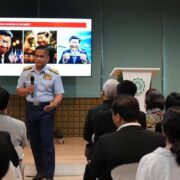Asean must focus more on climate matters

Jakarta—The findings of the recently released State of Southeast Asia 2025 Survey Report by the ISEAS-Yusof Ishak Institute should worry the political establishment in China. It shows that people in the region have an unfavorable view of China and have more confidence in the United States.
But such views may have changed if the heavy tariff imposed on the region by US President Donald Trump were taken into account.
Despite that, China is not loved but is rather feared in the region. The tactics used to control and react to what Beijing perceives as provocations by the US over Taiwan are backfiring. Still, would the “Trump effect” lead to what was until recently an unexpected outcome—that of having China, South Korea, and Japan cooperate among themselves on trade and economy?
Any strengthening of the relationships among those three countries would enable some positive ripple effects benefiting hundreds of millions of people in Asia and the Pacific region. But Southeast Asia would not be able to claim a major stake in the outcomes unless the region comes together on a common front.
Moreover, China will remain what it is, the biggest economic and geopolitical power in the Asia-Pacific and a formidable rival to the US for global primacy. As such, it is up to Beijing if it wants to be feared or loved.
Its Belt and Road Initiative is not enough. No matter how transformative it is, people generally dislike aggressive behavior, as shown by people’s reaction to Trump’s attitude and behavior.
As shown by that Southeast Asia 2025 Survey Report, the possibility of heightened tensions and any belligerent approach to geopolitical challenges will be seen negatively.
The survey explains that “40.7 percent of the respondents feel that the US’ engagement with Southeast Asia under President Trump will either increase or increase significantly. Among these, more than a third (38.7 percent) attribute it to Trump’s tough stance on China to maintain a balance of power.”
I do not believe that people in the region have an intrinsically negative view of China, considering the unmatched and unparalleled historical links and connections that exist between them. But ultimately, this is China’s game to lose. The citizens of Southeast Asia must focus on what they can control and where they have direct influence.
What should matter most to Southeast Asia, at least for now, is neither the positioning of Beijing and Washington over Taiwan nor the skirmishes between the two big powers. They’ve realized that the only way to have a say at the table where major decisions are taken is through unity and stronger cooperation.
That is why, according to ISEAS-Yusof Ishak Institute’s report, “40.2 percent of the respondents prefer to accelerate Asean regional integration among member states in response to rising protectionism and nationalism.”
But if the survey attracted a lot of attention to how people look at China, we should not forget that the main finding was that people in the region are concerned about climate change. This is one area where this community of nations can move in unison with common strategic actions and coordinated policies at the level of individual member states.
What is the real political value of documents like the Asean Climate Change Strategic Action Plan 2025-2030 or of the Asean State of Climate Change Report? As informative as they are, we need political decisions at the highest levels of policymaking, and this is at the level of heads of state.
Why not have a special Asean summit dedicated solely to climate action? The European Union often convenes unscheduled meetings with its heads of state if urgent matters arise.
And how about a global initiative like a Southeast Asian version of the Petersberg Climate Dialogue? Substance is paramount, but symbolism is nevertheless important.
Asean could engage the secretariat of the United Nations Framework Convention on Climate Change and come up with a joint initiative on mitigation or adaptation, or climate finance.
Climate is among the most pressing issues Asean can deal with, but as we know, there are other geopolitical matters that this regional association must contend with.
To exercise influence at geopolitical levels, Asean needs to be more respected. This would happen only when Asean, as a “collectivity” of nations, takes the initiative and goes bold. The Jakarta Post/Asia News Network
——————
Simone Galimberti is a freelance writer who focuses on regional integration, human rights, and geopolitics in the Asia-Pacific.
——————
The Philippine Daily Inquirer is a member of the Asia News Network, an alliance of 22 media titles in the region.

















